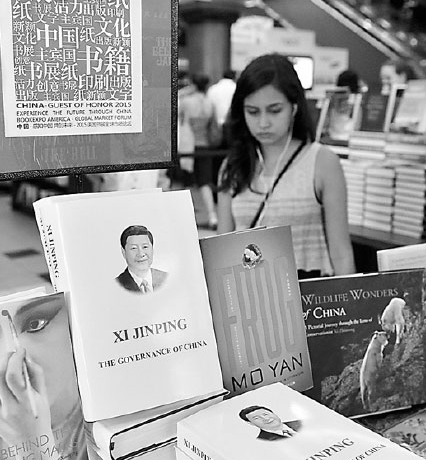Translation seen as key to global discourse

Xi Jinping: The Governance of China is displayed in a section for Chinese books at a Barnes and Noble store on the Upper West Side of New York City.
The accurate translation of such slogans as "cracking down on both tigers and flies," "the strong pass of the enemy is like a wall of iron," and "One Belt, One Road" has long been a topic of debate among translators and scholars. In a recent forum, scholars proposed that translation of central government documents should strive to retain the Chinese flavor while delivering the correct meaning.
The first forum on the translation and research of central government documents was co-hosted by Central Compilation and Translation Bureau and Tianjin Foreign Studies University in Tianjin from July 9 to 10.
Cai Fangguo, deputy director of the Central Compilation and Translation Bureau, said that central government documents are important carriers of China's discourse system. The translation of these files plays a leading role in China's international communication and demonstrates the nation’s theoretical and practical achievements in the field of Marxism, Cai said.
Systematic translation of central government documents is conducive to introducing the governance philosophy and ideas of the CPC to a global audience while standardized translation will help ensure accurate and consistent expression, Cai noted, adding that targeted translation will enhance mutual understanding and communication so that China's discourse system is able to be better recognized and accepted by the international community.
However, China's international communication capacities and system are far from sufficient, said Xiu Gang, president of Tianjin Foreign Studies University.
Since the reform and opening up, China has made tremendous progress in economic development, but the construction of international discourse has failed to catch up. In particular, some ideas and opinions are often wrongly interpreted, Xiu said.
We must change the status quo, Xiu said. In this sense, promoting the translation and research of central government documents not only reflects China's reality but also that of the world.
"The publication of Xi Jinping: The Governance of China has attracted great attention from oversea readers,"said Yu Yunquan, deputy director of the Center for International Communication Studies.
As China's experience and proposals gain currency in the global arena, new opportunities arise for the nation's political discourse, Yu said.
The key lies in discourse innovation because the Chinese texts decides whether the content will be welcomed in the world, Yu said.
Finally, authorities, team of translators, media and publishers need to form a benign work mechanism and institutional arrangement accordingly, Yu said.
"Translators must put readers first," said Xu Ya'nan, former director of the Department of Translation and Interpretation under the Ministry of Foreign Affairs.
Due to the huge differences in languages, geographical environments and lifestyles among various countries, the translation of central government documents must take into account readers' linguistic and thinking habits while adopting effective skills and strategies to generate better communication results, Xu said.
A search on the CNKI net, a Chinese academic journal database, shows that there are 13,309 papers about central government documents from 1957 to present, of which 377 articles focus on translation, 187 on language analysis, and 12,745 on interpreting the content, said Wang Mingyu, vice-president of Tianjin Foreign Studies University.
Research in the field is generally concentrated on certain subjects and perspectives. Most of the papers are about Chinese-English translation, meaning that research on central government documents still has room for improvement, Wang said.
